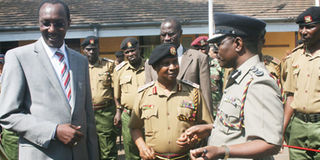Kenya police units to train together

Police Commissioner Matthew Iteere (second right), AP Commandant Kinuthia Mbugua (centre) and Kenya Airways CEO Titus Naikuni at the Embakasi AP Training College at the launch of a new curriculum for the forces. Photo/PETERSON GITHAIGA
Regular and administration police recruits would be trained together as part of the ongoing reforms.
This is designed to reduce conflicts between the units and standardise training, it was disclosed on Thursday.
Instructors from the two units have been meeting to draw up a common training programme ahead of the national recruitment expected soon.
After the basic, joint course, the recruits will receive specialised training to suit their services.
On Thursday, 38 officers from the regular and administration police and the General Service Unit met at the AP Training College in Embakasi, Nairobi, to start the process.
Police have frozen recruitment following recommendations by the Justice Philip Ransley taskforce which declared the current curriculum outdated.
Police Commissioner Mathew Iteere said the course would also help the instructors to “connect better” with recruits.
“We lack trust from our customers (the public) and unless we regain it reforms will be a mirage,” he said.
He wants the force to regain the positive status it had in the 1970s when it was rated the best in Africa.
AP Commandant Kinuthia Mbugua said the new curriculum, whose main focus would be investigations, was almost complete.
“Reforms will however be futile if the police officers don’t change their behaviour and attitude,” Mr Mbugua said.
The Ransley report is being implemented by a committee headed by Kenya Airways boss Titus Naikuni.
“Security does not involve police alone but all Kenyans. Change is a must and we can’t stop it,” Mr Naikuni said.
A similar course brought together officers at the CID Training School in South C, Nairobi, in August.
Once the Constitution is fully implemented, the police two units will fall under the command of Unlike before, it gives AP officers powers to investigate cases.




